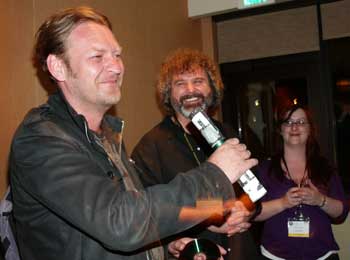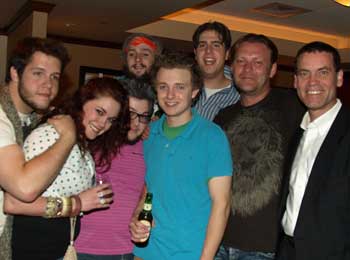About the Playwright
Vyacheslav Durnenkov (b. 1973) currently resides in Togliatti, a major center for automobile manufacturing in Russia. He has worked as an auto worker, a graphic artist, a playwright and a screenwriter. He, along with his brother Mikhail Durnenkov, Yury Klavdiev and others, came to the theater through the May Readings festivals run by the playwright Vadim Levanov in Togliatti at the beginning of the century. When the May Readings connected with Moscow’s New Drama Festival, Durnenkov and his Togliatti compatriots came to the attention of Moscow and the rest of the world as the leaders of the so-called "Togliatti phenomenon.”
Vyacheslav has written a number of plays with his younger brother Mikhail. Their best-known collaboration was staged at the Moscow Art Theater in 2005, under the title The Last Day of Summer. That play continues to be performed in the company’s repertoire. Their most recent joint effort, The Drunks, which is their 5th or 6th play together, was commissioned by the Royal Shakespeare Company and premiered at that theatre in the fall of 2009. A collection of plays by the Durnenkov brothers was published in Moscow in 2005. Vyacheslav’s plays written alone and produced in Moscow include Three Acts in Four Paintings (Praktika Theater, 2007), The Woman of the Questionnaire (Yermolova Theater, 2007), and Frozen in Time (Teatr.doc, 2009). Vyacheslav and Yury Klavdiev are on the team of screenwriters of the controversial Russian television series, School.
Like many writers of the new drama, the Durnenkov brothers do not write their plays out of long-standing theatrical traditions in their country. Vyacheslav was 24 years old before he even attended a theatre performance. Instead, they create theatre based upon what they observe in the life around them. Their first collaboration was a play about their fellow workers in a factory where they were both employed. Mikhail said about that play, "We were writing what we would want to see ourselves in the theatre but wasn't available" (Rees). The range of perspectives about contemporary Russia seen in their work may also be informed, in part, by their experiences growing up in an isolated village in the far north that was constructed to support the building of a railway. They recall that place as a kind of utopia that attracted people who believed they were building something positive for the future. With the kind of nostalgia often expressed by characters in their plays, Vyacheslav concludes: "That was one of the best things about the Soviet times." But his observations from this life, like his plays, offer some insight into the frustrations many felt when their world changed dramatically: "When everything started to collapse, they understood that they weren't building a new life, but were actually at the back of beyond doing they didn't know what" (Rees).
Rees, Jasper. “The Long and Frozen Road to Stratford.” The London Times. 8 Aug. 2009, national ed.: 6 – 7. LexisNexis Academic. Web. 11 April 2010.

Vyacheslav Durnenkov (left) with translator John Freedman and MFA student Cat Hagner receives a gift from the Towson University cast of Frozen in Time. May 2010. Photo: Julia M. Smith

Vyacheslav Durnenkov with director Peter Wray (far right) and cast of Frozen in Time. May 2010. Photo: Julia M. Smith



